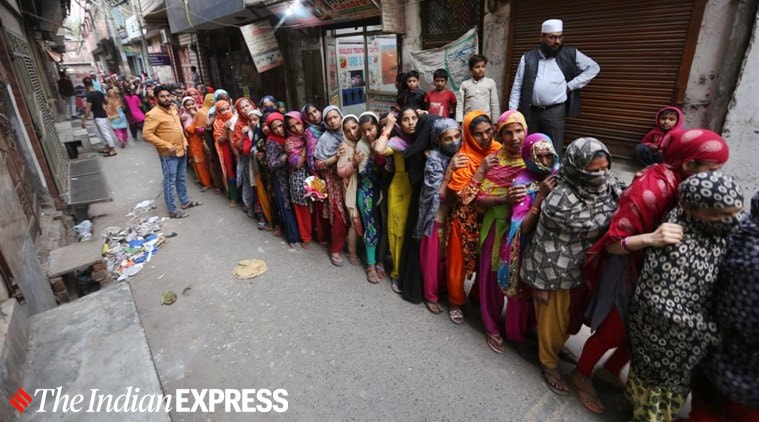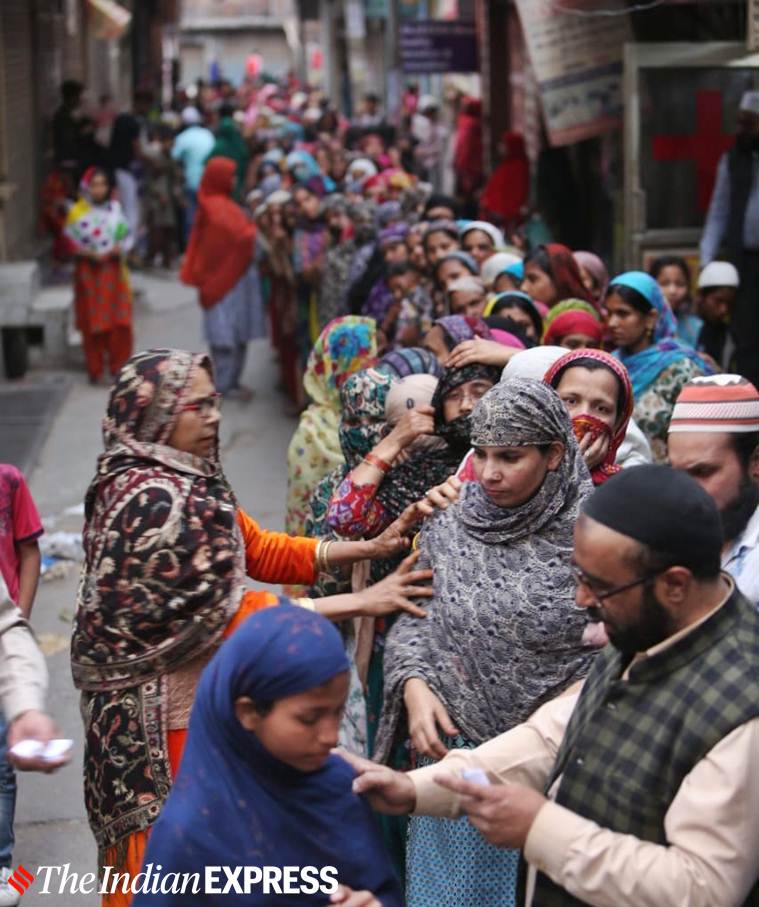 Women line up to collect essential items in Yamuna Vihar, Saturday. (Express photo: Gajendra Yadav)
Women line up to collect essential items in Yamuna Vihar, Saturday. (Express photo: Gajendra Yadav)
For over three hours on Saturday, Shabnam (27) stood in a 100-metre-long queue in Yamuna Vihar. At the end of the line were volunteers distributing ration such as rice and flour. With a five-year-old son to feed back home, she was determined to wait longer, if need be.
Even as normalcy slowly returned to riot-affected areas in Northeast Delhi, locals said they are staring at shortage of food and essential supplies.
Since Thursday, NGOs and volunteers across the city have been coordinating with locals to assist in distributing necessary items. Once the items arrive, a shop in the neighbourhood is converted into a temporary storage facility, from where distribution takes place.
 Women line up as volunteers distribute essential items in Yamuna Vihar, Saturday. (Express photo: Gajendra Yadav)
Women line up as volunteers distribute essential items in Yamuna Vihar, Saturday. (Express photo: Gajendra Yadav)
On Saturday, women in Yamuna Vihar were informed that food packets would be distributed by volunteers in the evening. By afternoon, more than 150 women lined up outside a shop and small arguments broke out as they jostled for a spot in the queue.
The women were given a paper chit with a number which had to be submitted at the distribution point to receive packets containing rice, vegetable oil, flour, tea leaves, sugar and salt.
“At this point, survival is most important… we are thankful that people are coming forward to help. Many of us have not eaten a proper meal in two days. We are doing our best to carry out food distribution as much as possible. Despite this, several areas in Sherpur and Chand Bagh need help,” said Mohammad Aslam, a resident and local businessman coordinating the supply.
Among the families in dire need of ration are those whose houses were damaged or burnt down.
Rubina, a resident of Maujpur, whose home was damaged, said: “The adults can survive hunger but children need food. My husband is a daily wage labourer and there is no work at the moment… We got a packet of milk from someone, a banana from another…”
Meanwhile, families who escaped the violence have opened their kitchens to those in need.
Raza, a resident of Shiv Vihar, said: “Thankfully, a lot of the houses in our area were untouched by violence so we have reserves of food. We have been making rounds with tea, bread and snacks and give them to those who need food. We don’t have a lot but we share because the communities needs it, irrespective of religion.”
According to locals, the violence has meant many traders are afraid to reopen shops. Suppliers from other areas, who used to send goods to Northeast Delhi, have also stopped trade for the time being.
“I opened my shop in great apprehension, simply because we don’t have much to eat. We rely on money that comes in daily and this violence has taken it away for now. Even if you open shops, there are no customers because people are still afraid to step out,” said Surendra, who runs a mechanic shop in Gokulpuri.
While shops in certain areas have reopened, residents alleged many are hoarding items or selling them at inflated prices.
“Police tell us that the violence is over. But our battles have not ended. Potatoes being sold for Rs 20/kg in other areas are being sold for Rs 50/kg here. Some shops are selling milk at Rs 100 a pouch. Our families are daily wagers; now there are no wages and essential items have become more expensive. We will have to rely on donations for a while,” said Sakeena, who has a family of five to feed.
To amplify demands of locals and material needed, volunteers have made appeals on social media platforms.
Students from Delhi University’s North Campus also donated ration, said locals. Sikh communities have also set up langars that prepare meals three times a day.
“Most people need milk and basic items like flour and dal to prepare a meal. The langars have also helped in giving people food. We are hoping the situation will normalise in some days as more people will open up shops,” said Mohammad Aslam, a resident.